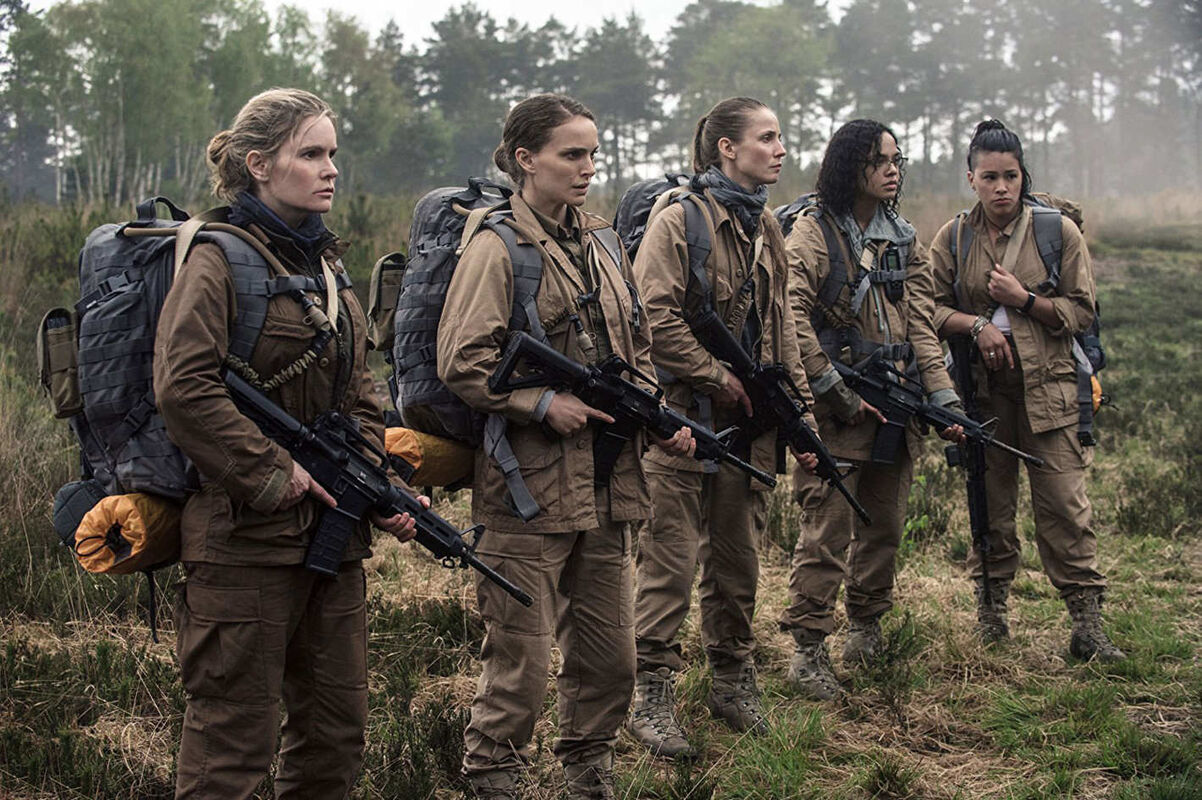In “But How Gay Is It?”, we seek to answer the biggest questions you have about a new movie release in theaters nowincluding, most crucially, the titular question. Does the movie have any queer characters? Are there stories involving same-sex lovers? Which gay icons star in the film? We’re bringing you all that and more.
What is Annihilation? Fuck if I know, honestly.
Director Alex Garland’s follow-up to his artificial intelligence thriller Ex Machina is, at its base, an adaptation of the first book in Jeff VanderMeer’s Southern Reach Trilogy. It follows a team of scientistsall women, all experts in their fieldas they investigate what they call a “shimmer.” It’s some kind of disturbance on Earth that looks prismatic, and seems to devour everything that enters it either by attacking them, or driving them so crazy they attack themselves.
Beyond that, though, I don’t really know how to summarize Annihilation. It’s sci-fi, but deeply human. It’s a horror film, but also quite beautiful. It’s visually dazzling, but somewhat empty narratively. It’s emotionally devastating, and yet I can’t put into words what I felt.
Are you high? No, but I kinda felt like I was as I walked out of the theater? I also think it might play entirely differently stoned. There’s a lot of visual flair there.
Who’s in it? Natalie Portman plays Lena, the protagonist and the wife of a man (Kane, played by Oscar Isaac) who returns from the shimmer deeply affected. Her fellow crewmembers are Anya (Gina Rodriguez), Cass (Tuva Novotny), Josie (Tessa Thompson), and, in an unnerving and fascinating supporting turn, Jennifer Jason Leigh as expedition leader Dr. Ventress.
Why should I see it? FIrst of all, I think it’s vastly worth supporting ambitious mind-fuckery in cinema, particularly when it centers women (and includes women of color as well). Second, Annihilation really has to be seen to be believed. The film I thought of most while watching it was mother!, not because it’s aggressively off-putting like that movie, but because it dares to try something radically different. What I think works best about Annihilation in comparison to mother! is that it feels less actively angry with its audience, and more interested in taking their hand and exploring something truly bizarre and mystifying.
But how gay is it? More gay than you’d think, in large part because Rodriguez’s Anya is gay. She doesn’t have a big romantic plot or anythingnone of the other supporting characters do, and Lena’s is only told in flashback. But her sexuality is explicitly mentioned, and that’s not nothing.
One of the main reasons I think TV has lapped film when it comes to LGBTQ+ inclusion is that non-specifically gay TV shows will include gay, bi, queer, trans, fluid, and gender nonconforming characters as supporting players. It’s much rarer to see movies do that, largely because they have shorter running times, and pointing out a character’s sexuality when they’re not going to be given a storyline involving their sexuality feels like a bad use of time. But Annihilation is a smart show of how you can acknowledge a character’s sexuality without making it a storyline. Now, a queer woman who sees Annihilation has a better chance of seeing themselves represented in the film, just like a black woman or Latinx woman would by way of characters who reflect them.
I think a lot about Nick and Nora’s Infinite Playlist when it comes to inclusion in film. That movie is forgettable to me in almost every aspect, except for the fact that two of the supporting male characters were gay. They didn’t have major story arcs, but the script took a moment to specify their sexuality. Thus, as a gay teen watching it, the movie stuck with me a little bit more than it would have otherwise. Not every movie is going to be Call Me By Your Name, Moonlight, Tangerine, or Carol. Some just need to add a little bit more of us.
What’s this I hear about some whitewashing? Yeah, this was an unfortunate one. Garland only read the first book when he was starting his casting process, which doesn’t mention that Portman’s character was of Asian descent. Additionally, Leigh’s character is of partial Native American ancestry in the novels. Garland owned up to his unintentional error, recognizing his complicity, while asserting that this was not a studio or producer decisionthat he was the one who handled the casting.
It’s fair to say Garland erred in the best possible faith. But it’s also more than fair to acknowledge that whitewashing is a systemic, deeply damaging pattern in Hollywood, and no excuse is good enough. Because there will always be an excuse. Does that mean we have to throw out Annihilation entirely? Of course not. Acknowledging a film’s egregious error in casting is important, but it’s not disqualifying. Moreover, I’m hopeful that the incident will make Garland even more aware when casting his next project.
Without spoiling the ending, can you describe what it’s like? It is a visual spectacle unlike anything I’ve ever seen on film. And it is well worth the price of admission.
Annihilation is in theaters now.
Don't forget to share:
Help make sure LGBTQ+ stories are being told...
We can't rely on mainstream media to tell our stories. That's why we don't lock our articles behind a paywall. Will you support our mission with a contribution today?
Cancel anytime · Proudly LGBTQ+ owned and operated
Read More in Culture
The Latest on INTO
Subscribe to get a twice-weekly dose of queer news, updates, and insights from the INTO team.
in Your Inbox













